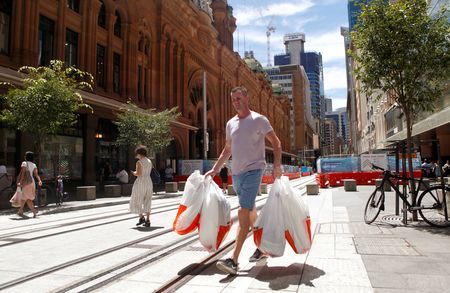By Wayne Cole
SYDNEY (Reuters) -Australia’s economy picked up speed in the June quarter as consumers kept spending and energy exports boomed, offering hope activity can weather sharply higher interest rates and cost-of-living pressures.
Data from the Australian Bureau of Statistics on Wednesday showed gross domestic product (GDP) rose 0.9% in the second quarter, in line with forecasts and up on the first quarter’s 0.7% rise.
Annual growth accelerated to 3.6% as the lowest unemployment rate in almost five decades underpinned household incomes and spending.
Indeed, so resilient was the economy that the Reserve Bank of Australia (RBA) has had to embark on an uber-aggressive tightening campaign to try and cool activity and restrain runaway inflation.
The central bank on Tuesday raised its cash rate 50 basis points to a seven-year high of 2.35%, bringing the total tightening since May to an eye-watering 225 basis points.
Markets are leaning toward another half-point hike in October, and for rates to reach as high as 3.85% given inflation is running at a 21-year peak of 6.1% and likely to top 7% by Christmas.
Inflation was widespread in the GDP report with its main price index jumping 6.9% for the year, the fastest pace since 1988/89.
Compensation of employees, a proxy for wages, boasted the biggest gain since 2010 as firms were forced to pay to attract and retain staff amid an unemployment rate of just 3.4%.
Consumers, however, were still not cowed and household spending added a meaty 1.1 percentage points to growth in the quarter. They have the means to keep shopping as the savings ratio dipped to 8.7%, still well above pre-pandemic levels.
“Households increased spending on domestic and international travel as COVID restrictions further eased and international borders remained open,” said Sean Crick, head of National Accounts at the ABS.
“While spending on transport grew strongly, households were still only spending two thirds of what they did pre-pandemic.”
Australia’s miners were also flush with cash as a global scramble for energy boosted prices for coal and gas. Coal alone brought in more than A$100 billion in the year to June, helping exports contribute 1.1 percentage points to Q2 GDP.
All these dollars showed up in nominal GDP which surged 4.3% in the quarter and a blistering 12.1% for the year, taking output to a record A$2.3 trillion ($1.54 trillion).
($1 = 1.4894 Australian dollars)
(Reporting by Wayne Cole; Editing by Jacqueline Wong & Shri Navaratnam)





